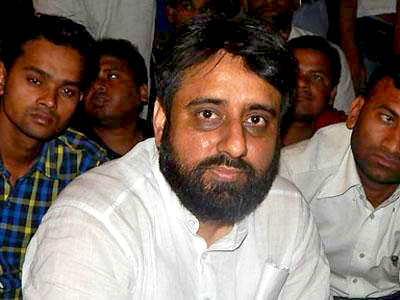New Delhi, Sep 11: Another sleaze scandal has rocked Delhi's ruling AAP, with a case of sexual harassment registered against its MLA Amanatullah Khan on a complaint by his sister-in-law, forcing him to quit as city's Waqf Board chairman.
 The complainant approached Jamia Nagar police station alleging that Khan had put pressure on her to get into a physical relationship with him, a senior police officer said.
The complainant approached Jamia Nagar police station alleging that Khan had put pressure on her to get into a physical relationship with him, a senior police officer said.
She also accused her husband of demanding dowry and putting pressure on her to get "physically intimate" with Khan, he added.
A case under IPC sections 354A (sexual harassment), 506 (criminal intimidation), 509 (word, gesture or act intended to insult the modesty of a woman), 120B (criminal conspiracy) and 498A (husband or relative of husband of a woman subjecting her to cruelty) was registered against Khan and the woman's husband, said the officer.
Crying foul play, Khan alleged he was being framed in false cases as he is an MLA of Aam Aadmi Party and was exposing corruption in the Waqf Board.
"I and my wife have nothing to do with my brother-in-law's wife for four years. She has framed me in wrong case. On Board's land, a hotel has come up and that I raised this issue and registered complaint with ACB. I had also exposed financial irregularities of Rs 280 crore in the Board.
"I wanted to construct schools, hospitals on Board's land. What is my fault? Why am I being framed? Because, I was the chairman of Waqf Board and exposing corruption in it one by one," Khan told reporters here.
Asked whether he has resigned from all posts, he replied he has quit from all posts including as MLA, political affairs committee (PAC) member, saying that he is just a party worker now.
However, the Aam Aadmi Party has not accepted Khan's resignation as the MLA and PAC member even as he is required to submit his resignation as the legislator toDelhi Assembly Speaker as per the laid down rules.
On Khan's resignation offer, AAP state convenor Dilip Pandey said, "He (Khan) has said what he had to. It is now up to the media to interpret the way it wants to."
The AAP had recently expelled former Delhi minister Sandeep Kumar+ from the party after a CD purportedly showing him in a "compromising" position with a woman went viral.
The woman has accused Kumar, who is currently in prison, of rape.







Comments
Jaathi buddi ne adu ...why to blame him...its quiet common in their society ...women.are into frequent pressure and tension ..kelagade 4 options ..male hodree 72 ...che papa
Add new comment